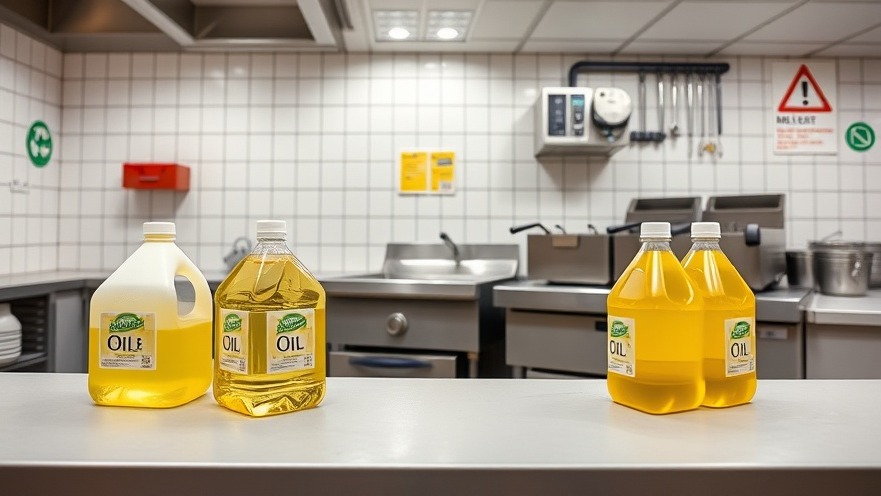
Why Proper Disposal of Cooking Oil Matters
Disposing of cooking oil responsibly is not just a matter of cleanliness; it's essential for environmental sustainability. In commercial kitchens and food plants, improper disposal methods can lead to severe clogging in plumbing, leading to costly repairs and maintenance. Moreover, when cooking oil enters water systems, it can disrupt aquatic ecosystems, harming local wildlife and contributing to pollution. Thus, understanding the best practices for disposing of cooking oil can create a significant impact on environmental health.
Best Practices for Cooking Oil Disposal
So, how should commercial kitchens and food facilities manage leftover cooking oil? Here are some effective methods:
Recycling and Reusing: Many establishments are beginning to recognize the value of recycling cooking oil. When discarded oils are collected, they can undergo processes to be refined and used as biodiesel. This method provides an eco-friendly alternative fuel source, contributing to reduced carbon footprints.
Oil Collection Services: Partnering with specialized waste collection services can ensure safe and environmentally friendly disposal. These services often recycle or repurpose the oil, thus turning potential waste into valuable resources.
Composting: Certain types of oil, specifically those that are vegetable-based, can be added to compost. This requires a careful understanding of volume, as too much oil in compost can hinder the decomposition process. Overall, this method integrates cooking oil back into the ecosystem.
The Role of Sustainable Practices in Hospitality
For hospitality professionals, adopting a sustainable food service strategy is crucial. This not only aligns with the growing consumer demand for environmentally responsible practices but also enhances the brand image. Implementing effective disposal methods for cooking oil is a part of a broader sustainability strategy that might include things like energy efficiency initiatives, compostable packaging, and reduced resource consumption.
Incentives for Sustainable Disposal Solutions
The push towards sustainability is not purely altruistic; businesses are discovering tangible financial benefits in reducing waste and employing green practices. For instance, establishments pursuing net zero hotel initiatives often see significant savings in waste disposal costs and can lessen their reliance on non-renewable resources. In addition, by implementing effective cooking oil disposal practices, they can enhance their offerings through high-quality food sourcing, appealing to eco-tourists and conscious travelers.
Why It’s Important for Travelers and Eco-Conscious Consumers
Travelers today, particularly eco-tourists and digital nomads, are increasingly prioritizing sustainable travel options. They expect hotels and restaurants to engage in practices that reflect their values. By ensuring that cooking oil is disposed of responsibly, hospitality venues can attract a growing segment of the market that prioritizes sustainability and environmental impact. Furthermore, it can foster community relations by linking with local initiatives for forest restoration or wetland restoration, thus exhibiting a commitment to overall environmental health.
Actionable Steps for Your Business
As a manager or owner in the hospitality or food service industry, consider the following steps:
Research local recycling options for cooking oil and partner accordingly.
Educate staff about the importance of proper disposal methods.
Share your sustainability efforts with customers to engage them and enhance your brand.
Not only can you formulate a sustainability strategy by working on cooking oil disposal, but you'll also contribute to a healthier planet.
Conclusion: Make a Difference Through Responsible Oil Disposal
By adopting safe and sustainable options for cooking oil disposal, businesses can make a meaningful contribution to environmental preservation. This aligns with the broader shift towards sustainability in hospitality and the increased consumer demand for responsible practices. As travelers like you increasingly seek eco-friendly alternatives, aligning your hospitality operations with these values will not only boost your reputation but also foster a resilient planet.
 Add Row
Add Row  Add
Add 




Write A Comment